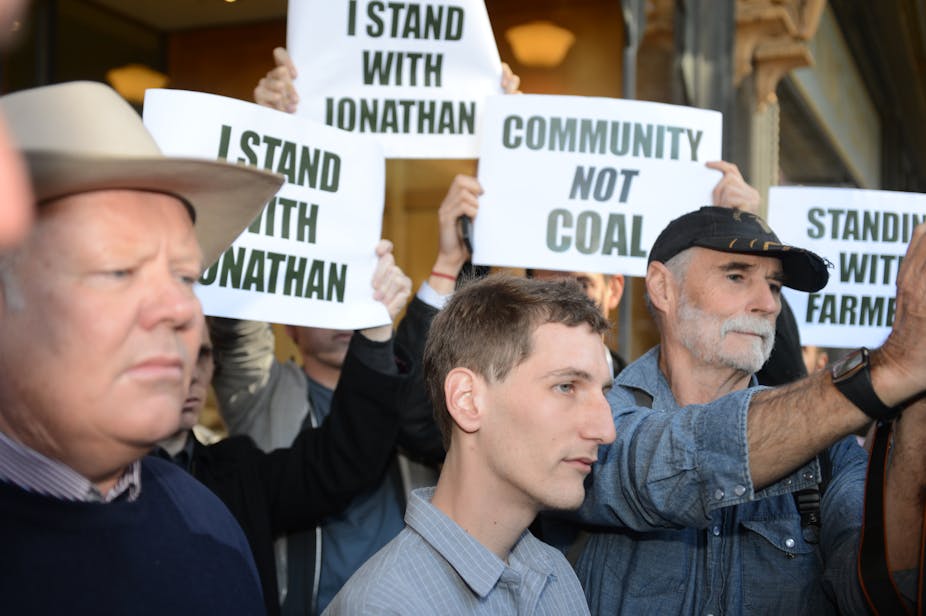Here is a tough question – what are the limits of legitimate protest? As Lord Keynes is famously reputed to have said, everything depends on everything else. What is protest? What is legitimate?
I’m going to take as my starting point that protest is legitimised by the rule of law. The kind of acceptable behaviour that one might observe in a liberal democracy is very different from that in a dictatorship.
Another way of stating the case is to argue that the social licence to protest varies in time and place.
Many protesters, however, are of the view that they have unlimited licence to protest. That once their intentions are self-declared to be noble that there can be no limit on their behaviour.
Licence to lie?
Take, for example, the Whitehaven Coal hoaxer Jonathan Moylan, who faked an ANZ press release stating that the bank had withdrawn a A$1.2 billion loan facility due to environmental concerns. He is currently awaiting sentencing after pleading guilty to disseminating false or misleading information affecting market participation. His actions were clearly illegal, yet there is a website that describes his actions as being civil disobedience and an act of good conscience. Elected members of the federal parliament congratulated him on his actions.
Consider another example. Clive Hamilton recently complained that Australian security agencies were monitoring anti-coal activists. Small-l liberal minded people might be horrified at that prospect – until we also read Elizabeth Farrelly in the Sydney Morning Herald telling us democracy has failed, and calling for a “people’s revolution”.
To be fair, Farrelly might be engaging in some hyperbole, but our security agencies are paid to be paranoid.
The rule of law
The thing is this: however noble “saving the planet” might be, in a liberal democracy, under the rule of law, protest must be conducted through both non-violent and non-coercive means.
Restricting violence and coercion is a legitimate function of government. As the great liberal economist Ludwig von Mises indicated:
One must be in a position to compel the person who will not respect the lives, health, personal freedom, or private property of others to acquiesce in the rules of life in society. This is the function that the liberal doctrine assigns to the state: the protection of property, liberty, and peace.
We might want to believe that environmental activists should be able to issue false media releases, or even conspire to overthrow the democratically elected government without interference from the authorities. But the proper way to do so is to campaign for those changes at the ballot box.
As it turns out, the environmental movement is failing to convince voters or politicians of their cause. Last year the International Energy Agency reported “15% of global CO2 emissions receive an incentive of $110 per tonne in the form of fossil-fuel subsidies while only 8% are subject to a carbon price.” With Australia about to abolish the carbon tax that 8% figure will be falling.
It’s not just Australia; the Climate Change Performance Index shows that “no single country is yet on track to prevent dangerous climate change”.
Small wonder the broader environmental movement is turning to non-liberal and non-democratic means to pursue their aims.
Making environmentalists accountable for their actions
The fossil fuel divestment campaign is a prime example. This is an internationally orchestrated, well-funded, and apparently sophisticated campaign against fossil fuel investment. Once you strip away the apparent sophistication of their argument you end up more or less with a call for a series of secondary boycotts of fossil fuel producers and their sources of capital.
At the moment environmental groups are exempt from the prohibition on secondary boycotts. This is an astonishing exemption for a country that trumpets equality before the law.
The Abbott government has flagged that this exemption will be removed. There are some, like my good friend Chris Berg, who argue that the whole notion of secondary boycotts are consistent with the right to free speech.
The fossil fuel divestment campaign, with its explicit aim of stigmatising Australia’s coal industry, might well fall foul of s1041E of the Corporations Act 2001. The same section of the same law used to convict Jonathan Moylan.
The campaign to convince investors to divest from fossil fuels on the basis of an undefined “carbon bubble” that can only exist if and when environmental activists convince government to change the rules of the game – having failed up until now – is something the corporate and market regulators should be closely examining.
Environmentalists have the right to campaign for their policies, but they don’t have the right to provide misleading stock market advice.
The argument that fossil fuels have social costs does not undermine my position at all. Yes, the social costs of fossil fuels exceed zero – but it isn’t clear that these costs exceed the social benefits of fossil fuel usage.
Access to cheap and reliable energy will do more to alleviate global poverty and foster economic development everywhere than the environmental movement ever will. By agitating for a divestment from fossil fuels, the environmental movement are condemning millions of people to a lower lifestyle and standard of living than they would otherwise enjoy.
Editor’s note: This story was updated on 25 July to correct a typo in this sentence: “There are some, like my good friend Chris Berg, who argue that the whole notion of secondary boycotts are consistent with the right to free speech.”

